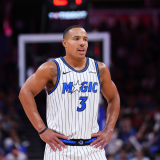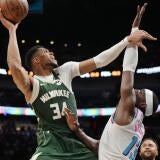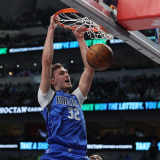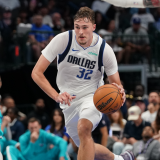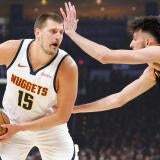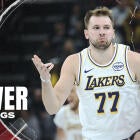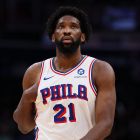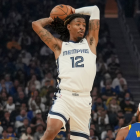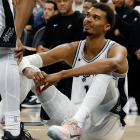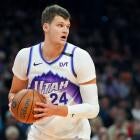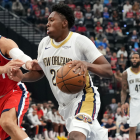Bronny James is making the most of newfound playing time, but he's still one skill short of a consistent role
James is impressing on defense, but his offense has a way to go
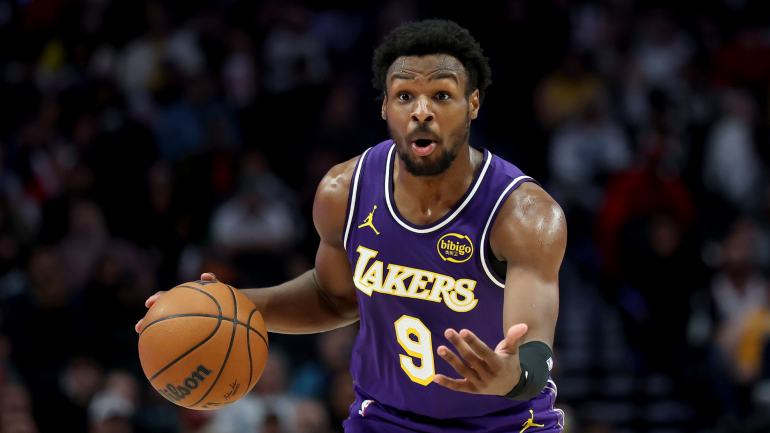
The biggest compliment you can pay Bronny James in his sophomore campaign with the Los Angeles Lakers is that he no longer stands out. It's a strange thing to say about someone literally named "LeBron James," as the first NBA player with that name has dominated the league for more than two decades now. But his son is a very different player. Stardom isn't a realistic goal at this point. The hope is just that he can fit in on an NBA floor.
A rash of Lakers injuries has given him that chance. Last season, he played double-digit minutes only five times: three blowouts, a meaningless end-of-season game, and a close loss to Denver in which the Lakers were without Luka Dončić, Gabe Vincent, Dorian Finney-Smith and the elder James. But with pretty much every Laker experiencing injuries thus far this season, Bronny has gotten some pretty meaningful run in real games over the past two weeks, playing 18 or more minutes in three reasonably close games.
And in that time, he's held his own. Despite fears that his presence would be a bit of a sideshow last season, James hasn't looked out of place participating in real NBA games thus far. He's by no means a perfect player -- we'll get into the weaknesses shortly -- but in those three longer stretches, the Lakers have been outscored by only a single point. Not bad for a bench player. And when he actually shares the court with either Dončić or Reaves (tiny samples, of course), the Lakers have actually fared quite well.
The selling point is and always has been his defense. Size was the primary question on this front when James arrived in the NBA. The NBA isn't exactly full of 6-foot-2 defensive specialists, but his 6-7 wingspan and deceptive strength have allowed him to hold up well on that end of the floor thus far. He's held opponents to 11-of-26 shooting as the primary defender this season and while you should always take tracking data like that with a grain of salt, it comes across on film. He can stay in front of most assignments and he contests more shots on a per-minute basis than any other Laker guard.
That isn't his best trait defensively either. What's stood out so far has been his defensive playmaking. James leads the Lakers in steals per minute and, among those who have earned any actual playing time, only Marcus Smart is averaging more deflections per minute. Obviously it's a bit easier to be that aggressive when you're playing fewer minutes; conserving energy isn't as meaningful for a bench player as it is for a starter. But this is where James jumps off the screen. He's a nightmare in passing lanes.
We knew James could defend. The jump he showcased during summer league was as a ball-handler and playmaker. We're getting some of that in real games this season. He's a high-IQ player who has been especially dangerous as a passer when attacking closeouts. Check out this assist against Portland. Jerami Grant closes out a bit too hard, so James blows him. This forces Deni Avdija to help. James doesn't have to dump off to Jaxson Hayes because Jrue Holiday has rotated off of Rui Hachimura to help at the basket, but he catches Shaedon Sharpe ball-watching, creating an open 3 for Hachimura.
That vision and awareness of his surroundings in traffic near the basket is very valuable for a small guard and it has served him, and perhaps more pertinently his big men, quite well so far this season.
These traits are all meaningful and they may one day help James become a steady, NBA role player. But they all ultimately qualify as "little things." James is fitting in defensively. He's not a stopper and he probably doesn't have the physical dimensions to be one. He's making plays within the flow of the offense, but he isn't bending defenses in ways that lead to consistent creation. They are supplementary, helpful for a player who either has one elite skill or survives by being passable at everything. James' hope is probably the latter and that's where the concerns start to arise. He still isn't putting the ball in the hoop.
That's the be-all and end-all here, the obstacle standing between Bronny James and a long, productive NBA career. He is never going to be a primary scorer. He does, however, have to be enough of a threat to score to keep defenses honest. Once he gets there, the little things start to pile up and you get a usable reserve in higher-leverage games. As it stands right now, there's just not much of a reason for defenses to guard him.
Shooting has always been a weakness for James. He shot just 16-of-60 from deep at USC, and while that's a small sample, he wasn't a great free-throw shooter either at 67.6%. Thus far, that's more or less how defenses have treated him. His man frequently creeps into the lane, making life harder for other Laker drivers. This isn't just happening when James sits in the corner. It happens mid-possession. Take this play against the Heat. James begins the action in the dunker's spot and, when he gets the ball, Nikola Jović steps over to avert a layup. He proceeds to follow James back onto the perimeter, but when James passes the ball to Austin Reaves, it's as if Jović forgot he was there.
It's one thing to simply be a weak 3-point shooter. While that is probably the single biggest impediment to offensive success as a reserve, it's not necessarily a deal-breaker. That James is also struggling this much as a finisher makes things significantly harder. That success he's having attacking closeouts as a passer just isn't translating to scoring. Once again on this possession, James is left wide open and takes advantage of the late closeout to get into the lane. This is by no means an easy finish, especially with the bigger Javonte Cook on his tail, but he isn't close.
On this possession in Wednesday's win over the Spurs, Stephon Castle does what so many defenders do against him: cheat off of him in the corner to help against a driver (in this case, Dončić). James beats Castle's frantic closeout, but he sees the crowded paint and, rather than challenge Kelly Olynyk, he passes up his runway and settles for a baseline runner.
When you're a small guard trying to finish through traffic, you generally need quite a bit of either craft or explosiveness. James doesn't have either, at least not yet. You see the difference between James and an elite NBA athlete on this Andrew Wiggins chase down block. Wiggins, like the elder James, was a No. 1 pick with elite physical tools. The younger James lacks them, and without a counter, Wiggins does to Bronny what LeBron has spent 20 years doing to unsuspecting guards in transition: he made him look small.
All of this combines to make James a somewhat unusual young prospect. Most young players in the NBA have a single skill that gets them in the door -- very often based on scoring -- and the hope is that they'll be able to round out the rest of their game over time. This is the case to an extent with Nick Smith Jr., another beneficiary of these early Laker injuries. He was a former lottery pick in Charlotte whose offensive upside is evident every time he touches the floor, but who has real holes throughout the rest of his skill set that will need work over time. James came into the league with a relatively mature game. He knows his role and by and large does the right things. He's just so limited as a scorer at this point that keeping him on the floor when the roster is healthy and the games really count is just probably a non-starter at this stage.
We're still very early into a career that on some level began and was irrevocably altered by a cardiac arrest incident in the summer before he played at USC. He's still playing catchup to an extent and he has time. His contract is guaranteed through next season. But this is the hurdle he's going to have to clear. He doesn't have to be a great scorer. He doesn't even have to be a good one. But he needs to become enough of a threat to actually put points on the board that his team can keep him on the floor and take advantage of everything else he brings. If he's going to be a real NBA player, he has to be able score.


